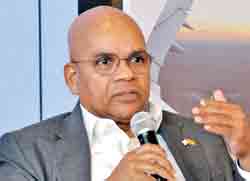Saturday Feb 21, 2026
Saturday Feb 21, 2026
Tuesday, 11 November 2025 03:10 - - {{hitsCtrl.values.hits}}
 |
| SAGT CEO Romesh David - Pic by Lasantha Kumara |
South Asia Gateway Terminals (SAGT) CEO Romesh David said for Sri Lanka to attract credible investors into public-private partnerships (PPPs), the Government must ensure clarity of purpose, alignment among agencies, and speed in decision-making and fairness in execution.
Speaking at a recent forum, he outlined key ingredients for successful PPPs, stressing that investor confidence depends primarily on a Government’s ability to demonstrate clear purpose, policy alignment, and credible commitment.
“The first and most important factor for any investor is clarity of purpose and alignment across all Government agencies involved,” David said, speaking on lessons learned from Sri Lanka’s own PPP experiences.
He noted that the entire public sector, including finance, investment, customs, port authorities, and other regulatory bodies, must share a common agenda and communicate that consistently.
He added that transparency and coordination should extend beyond Government institutions to include public stakeholders and trade unions, ensuring collective understanding and support for major infrastructure ventures.
Emphasising the need for speed and efficiency, David warned that Sri Lanka cannot afford multi-year delays in decision-making if it wishes to remain competitive.
“In today’s global investment environment, no serious investor will wait two to five years for approvals. Once clarity and policy direction are established, the process must move quickly,” he said, citing the long gestation periods of several major port projects as examples.
David also underscored the importance of fairness and separation of roles between the public and private sectors, pointing out that conflicts can arise when Government agencies act as regulator, operator, and competitor simultaneously.
“It makes little sense for a Government entity to be landlord, shareholder, and competitor all at once. The roles of regulator, owner, and operator must be clearly separated,” he stressed, adding that such clarity was one reason SAGT became a globally recognised PPP model.
He attributed SAGT’s success to its strong international partnerships, including the involvement of the Asian Development Bank (ADB) and the International Finance Corporation (IFC) as both shareholders and lenders, which enhanced transparency and investor confidence.
“As a result, SAGT is now cited by the ADB and other agencies as a textbook example of how a PPP should be structured and governed,” David said, noting, however, that Sri Lanka had “failed to build on that success” by replicating the model in other sectors.
David stressed that Sri Lanka’s future PPP success depends on the country’s ability to maintain policy consistency, ensure institutional coherence, and move with urgency, so that projects can transition from concept to reality without unnecessary delay.